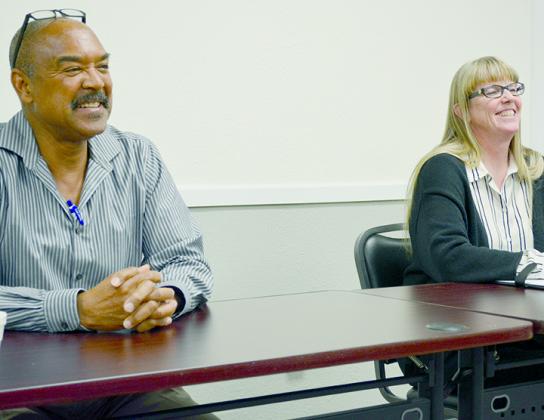There was far more agreement than disagreement on the issues when the two Snyder mayoral candidates met in a public forum Thursday evening.
Mayor Tony Wofford and challenger Stephanie Ducheneaux discussed how they would deal with several issues, ranging from streets to engaging young voters, during the forum at College on the Square.
They found themselves sitting on the same side of the fence on most of the issues.
They did differ, however, when asked about their top priority, if elected.
Ducheneaux, the dean of instructional affairs at Western Texas College and a former Snyder City Council member, said maintaining an adequate water supply for local residents would be priority No. 1 during her tenure.
“My top priority has always been water,” she said. “Ever since 2011, when we ran out of water, I’ve been scared to death. Water conservation is very, very important. I really want citizens to come back to the fact that water is a very precious resource in our area.”
Wofford, who is seeking his third term as mayor, said finding sufficient housing would be his main concern.
“I’ve sat in on several planning sessions and the No. 1 issue has always been housing,” he said. “I’d like to see what we can do to find more affordable housing here. People are coming here but they can’t find a place to live.”
Ducheneaux said establishing a regular maintenance schedule for local roads and figuring out how to keep the Snyder Police Department fully staffed were two other priorities.
Wofford, meanwhile, advocated for moving forward on goals established by the city’s comprehensive master plan.
Ensuring the progress of the 20-year master plan also was a point of contention.
“Where are we on the master plan?” Ducheneuax asked. “We need to implement some kind of structure so we can review our progress on it every few years.”
Wofford conceded that more could be done to monitor implementation of the plan.
“I don’t think we’re doing a good job of implementing the plan,” he said. “One thing I’d like to see happen is community forums held regularly so we could pull out the plan and see where we’re at.”
Both candidates agreed that maintaining the city’s infrastructure should at the top of the to-do list when the next city budget is adopted later this year.
“I think we’re doing a good job on infrastructure. Those things are important. It’s what the taxpayers pay for,” Wofford said. “But I’d like to find ways to pay for road maintenance and repair. That’s my main priority for next year.”
Ducheneaux concurred.
“I agree that streets are the biggest thing people are talking about,” she said. “But we have to balance wants versus needs. We need to start looking at big capital outlays and decide if they’re something we really need or just something that we’d like to have.”
On the topic of economic development, both agreed that the Development Corporation of Snyder (DCOS) should be at the forefront of such efforts.
“I think city hall does have a responsibility to promote economic growth, and the DCOS is the outlet for that,” Ducheneaux said. “Maybe we should do more to promote DCOS. We need to support what they’re doing and make sure DCOS remains viable.”
Wofford said he believes Snyder is undergoing a period of economic growth, although the signs of such growth are more subtle than brick-and-mortar construction.
“We haven’t seen a lot of new construction, but we are seeing more activity around the community,” he said. “The unemployment rate is the lowest it’s ever been and people are spending money in the community.”
Other issues discussed included:
• Incentives for businesses — Both candidates agreed that incentives should be available to attract new businesses and also available to allow existing businesses to expand.
• Leadership styles — Wofford said he brings a “passionate” approach that emphasizes consensus-building, while Ducheneaux described herself as a “consistent and fair” person who would get everyone at city hall involved in providing the best government possible.
• Transparency — Both agreed that the city council should always adhere to the requirements of the Texas Open Meeting Act.
• Sales tax — If the Texas Legislature follows through with plans to increase the sales tax the state collects, both candidates said the city should be allowed to increase its portion, as well, as long as the extra money would be earmarked for specific needs, such as roads.
• The biggest difference between them — As a retiree, Wofford said he would be able to dedicate more time to his duties and questioned whether Ducheneaux would be able to match that as a full-time college employee. In response, Ducheneaux joked that she was “Superwoman” and the prospect of filling two posts didn’t scare her “in any way.”
Ducheneaux added that gender played a role in her decision to run for the position. “I would really like to see a woman’s perspective and voice on the council,” she said.
• Competing with the private sector to fill staff vacancies — Both said the city can’t compete with the oil and gas industry on salaries, but said that establishing a positive workplace environment and good benefit packages could help offset the salary differences.
• Both candidates struggled a little trying to decide how best to use a hypothetical $1 million, no-strings attached grant. Wofford proposed investing it for future use while Ducheneaux said that it would be a good opportunity to pay for some of the city’s “wants,” rather than needs.
Image
Body


